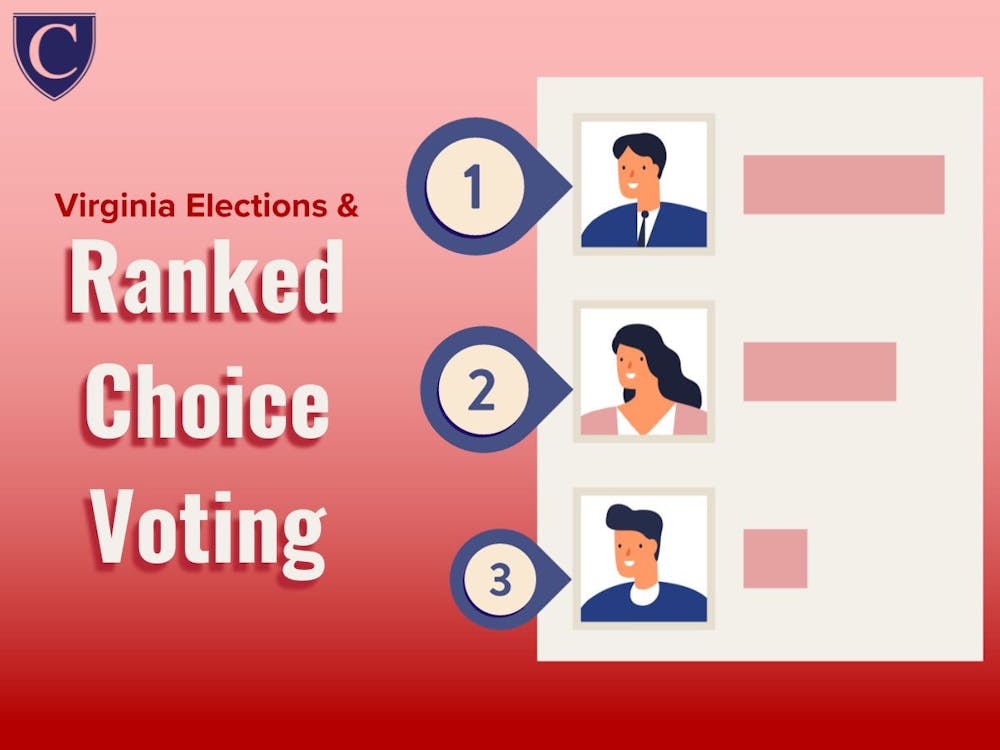Ahead of a crucial election season in Virginia, the topic of ranked choice voting has come up again as an alternative method of voting.
As per UpVoteVa’s Henrico County web page, ranked choice voting is a process in which voters rank their top candidates instead of choosing just their first choice. If no candidate forms a majority in the first vote, whichever candidate receives the fewest first-place votes is eliminated. That candidate’s votes are redistributed to the second-choice candidate on each voter’s ballot. The process continues, eliminating one candidate at a time until a candidate reaches a majority.
Local groups like UpVoteVa and FairVoteVa have worked extensively on ranked choice voting education and advocacy, and ranked choice voting has recently been used in statewide primaries.
The Virginia GOP used ranked choice voting in their primary elections to fill the late Rep. Donald McEachin’s seat last December and also used a form of ranked choice voting to select their candidates in a successful 2021 election season according to The Virginia Mercury.
This November, all 140 seats in the Virginia General Assembly will be up for election. The Virginia General Assembly passed a bill in 2020 which allowed localities to implement ranked choice voting for local governing bodies, like city councils or boards of supervisors. In Arlington County’s web page, the county employed ranked choice voting to fill two county seats in June, making it the first and only county to use ranked choice voting in Virginia.
UR Law professor Henry Chambers described the principle of ranked choice voting as a way to increase civic engagement. In theory, ranked choice voting would get more independent voters out to the polls, increasing third-party or independent votes and decreasing the partisan divide.
“The idea behind ranked choice voting is, sure you should [vote,]” Chambers said. “What we're going to do is give you an opportunity to show who you prefer and then an opportunity to vote for the person who is more likely to actually win.”
Chambers said those voters might use their first ranked choice to vote for the candidate they think has the best chance of winning, rank their favorite candidate in the middle and rank the candidate across the aisle third. Voters would see that they still impact the outcome of the election but still feel like they supported their preferred candidate, he said.
“[Ranked choice voting], in theory, is something that we might be able to use to at least take away the notion from people that there's no point in voting.” Chambers said.
Ranked choice voting has reached the newer generation of voters – both College Republicans and College Democrats leadership at the University of Richmond have discussed it in length. College Democrats Co-President and UR Junior Izzy Blaylock said that she believed ranked choice voting would help to elect a candidate that would be a larger representative of an electorate.
College Republicans President and UR senior Brady Lang also expressed the optimism he had for ranked choice voting and said it might contribute to the perceived fairness of elections.
“I feel like it sort of makes it more fair to a broader pool of candidates,” Lang said, referring to independent and third party candidates.
Enjoy what you're reading?
Signup for our newsletter
Supporters of ranked choice voting like Liz White, the executive director of voting advocacy organization UpVoteVa, believe the method can help a party select a candidate that is more electable in a general election than a candidate chosen by the traditional first-past-the-post system.
White believes ranked choice voting is beneficial to political parties because it selects candidates that are more likely to have a broad base of support and are therefore more likely to succeed in a general election, she said.
White also said that ranked choice voting would help lower the amount of negative campaigning by disincentivizing smear campaigns against other candidates. A candidate would be discouraged from attacking a different candidate because they would be less likely to receive a second-place or third-place vote from that candidate’s supporters.
With further use and discussion at local and state levels, ranked choice voting supporters hope that the system will eventually make its way to federal elections, most particularly congressional elections.
Contact city & state writers Thomas Ham and Dylan Germain at thomas.ham@richmond.edu and dylan.germain@richmond.edu.
Support independent student media
You can make a tax-deductible donation by clicking the button below, which takes you to our secure PayPal account. The page is set up to receive contributions in whatever amount you designate. We look forward to using the money we raise to further our mission of providing honest and accurate information to students, faculty, staff, alumni and others in the general public.
Donate Now



